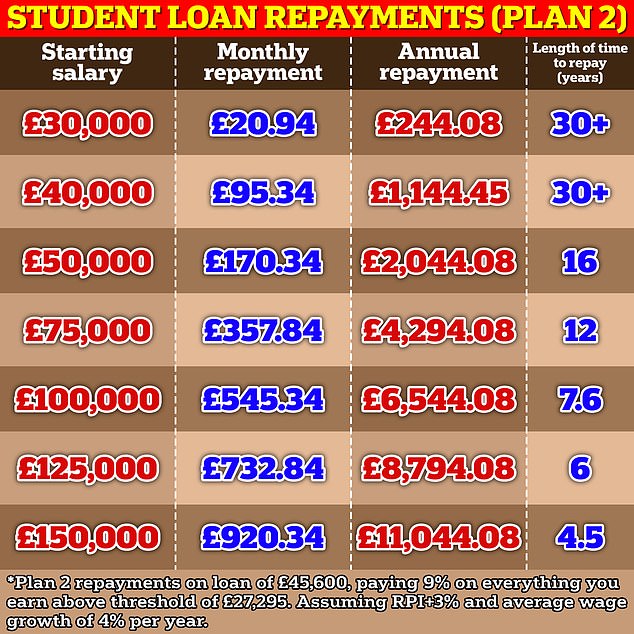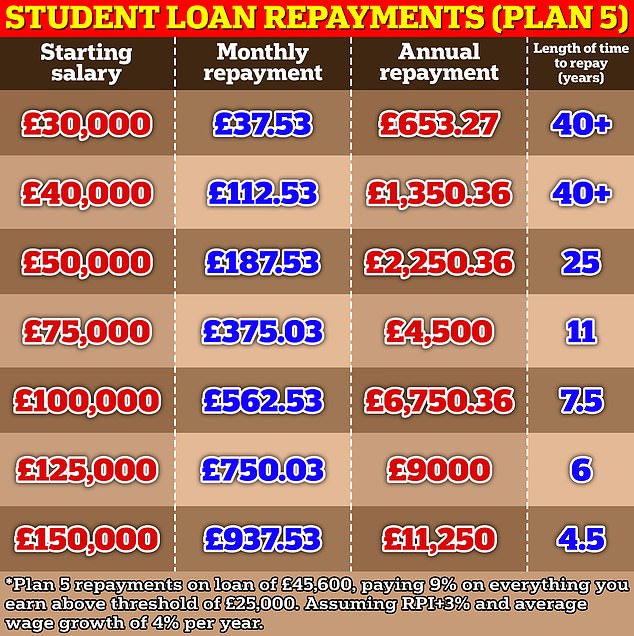How long will it take to pay back your student loan with your current salary?
The crisis around the cost of living, private rental housing and frozen income thresholds means that young people face significant financial burdens.
Add in student loan payments and college graduates face what is essentially an additional 9 percent tax on their income that could stay with them for decades.
Many graduates regret it when they check their balance and see that it has increased by thousands of pounds and their repayments aren’t even making a dent in the interest accrued.
Payback period: Graduates start paying back their loans at different thresholds depending on when they started college
This is especially true for taxpayers who went to university after 2012, when tuition fees tripled to £9,000 per academic year.
Some have proposed raising the threshold at which graduates begin paying back their student loans, or lowering the interest rates added to the loan.
But there doesn’t seem to be much political will to change the current student loan system, meaning many taxpayers will face an additional burden during their working lives.
We look at how much you can expect per month, depending on when you started studying, and how long it will take to pay off the debt.
When do students start paying back their loans?
Unlike a standard loan, the system behaves more like a graduated tax and increases the more you earn. What and how you pay it back depends on which of the five different repayment plans you have.
Those who started university before September 1, 2012 will be covered by Plan 1 and will start repaying their loans once they earn more than £22,015 per year.
Those on Plan 2, who started university between September 1, 2012 and July 31, 2023, will start repaying their loans once their income exceeds £27,295, and those who started after September 1, 2023 will follow Plan 5 and start paying back when they earn more than € 25,000.
In Scotland, students follow Plan 4 and start paying back the loan once they earn more than £27,660 a year.
All graduates, regardless of the plan they follow, pay 9 percent of their income above the threshold, while postgraduate loans pay 6 percent.
For basic rate taxpayers, this means a marginal tax rate of 39 percent.
The level of interest applied to the loan has been a controversial topic, with many graduates not even making a dent in the interest accrued each month.
Typically, the interest rate applied is based on the retail price index (RPI) rather than the consumer price index (CPI), which is more commonly used.
When the RPI rose to 13.5 percent in March 2023, the government introduced a 7.6 percent cap on all loans.
The current interest level for each plan is:
- 7.6% on the postgraduate loan plan
What do you have to pay back per month?
When the government changed the rules for repaying loans with the introduction of Plan 2, it also increased the threshold at which graduates repay them.
Supporters of the scheme said it meant people would only pay back if they earned more than a comfortable salary.
However, this remains frozen at £27,295 per year, meaning that as wages grow with inflation, more people will pay back their loans.
The Government’s student loan figures show that the expected average debt among the cohort of borrowers who started their studies in 2022/2023 is £45,600, when they complete their studies.

An analysis of repayments based on average debt, paying 9 percent on anything earned above the threshold and assuming an interest rate of RPI + 3 percent and wage growth of 4 percent per year, shows how many graduates will repay per month.
Those earning more than £30,000 will pay back £244.08 or £20.34 per month. This rises to £95.34 a week, or £1,144.45 a year, for those on £40,000 a year, according to analysis by wealth management firm Quilter.
This almost doubles to £170.34 for those earning £50,000 a year. Six earners pay £545.34, or £6,544.08 per year, rising to £920.34 per week, or £11,044.08 per year, for those on £150,000.
Monthly repayments are even higher for lower earners on Plan 5, with those earning £30,000 repaying £37.53 per month and £112.53 for those on £40,000.
However, higher income earners will not pay back much more than those on Plan 2.
Graduates earning £75,000 will pay £375.03 per month, compared to £357.84 for those on Plan 2, while those earning £100,000 will repay £562.53 per month, compared to £545.34 with Plan 2 .
> We explain whether it is worth saving to repay your loan early

How long does it take to pay back your student loan?
The prospect of paying hundreds of pounds a month in student loans for decades is not pleasant.
So how long would it take to pay off the mountain of debt?
Those in Plan 2 will have their loans forgiven after 30 years, and Quilter’s analysis shows that graduates earning £30,000 and £40,000 are unlikely to repay the full loan amount.
Likewise, graduates earning the same salaries under Plan 5, which are wiped out after forty years, will spend most of their working lives repaying their loans.
Those earning £50,000 will spend 26 years on Plan 2 and 25 years on Plan 5 to repay their loan, dropping dramatically to 12 and 11 years for those on £75,000.
Although unlikely, those earning £150,000 straight out of university will spend just 4.5 years of their working life paying off their student debt, under both Plan 2 and Plan 5.
If you earn more or your circumstances change, this may obviously shorten or lengthen the overall period, but it does give a good snapshot of the overall repayment period for each paycheck.
Because it is based on the amount you earn, it will take longer to pay off the loan because more interest accrues over time.
Tom Allingham, spokesperson for Save the Student said: ‘According to our latest National Student Fees Survey, 67 per cent of respondents are concerned about having to pay back their student loans.
‘This figure is higher than last year and is related to the introduction of the regressive Plan 5 repayment plan, which benefits the highest-earning students and increases lifetime repayments for their low- and middle-earning peers.
‘But as daunting as some repayment figures may seem, it’s worth remembering that they should still be fairly manageable, that the debt will eventually be forgiven and that none of it will have any impact on your credit score.
‘Nonetheless, these changes are regressive and we would encourage the government to reconsider how the new plan will disproportionately and negatively impact low- and middle-income graduates.’
Some links in this article may be affiliate links. If you click on it, we may earn a small commission. That helps us fund This Is Money and keep it free to use. We do not write articles to promote products. We do not allow a commercial relationship to compromise our editorial independence.

